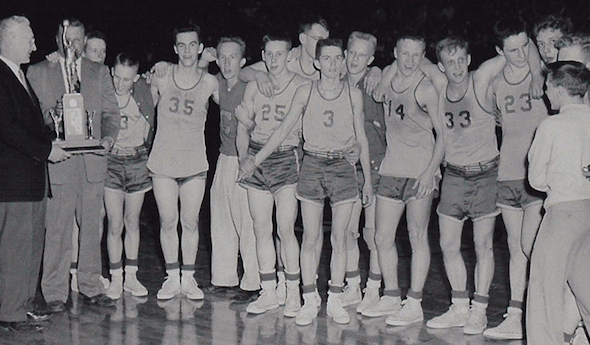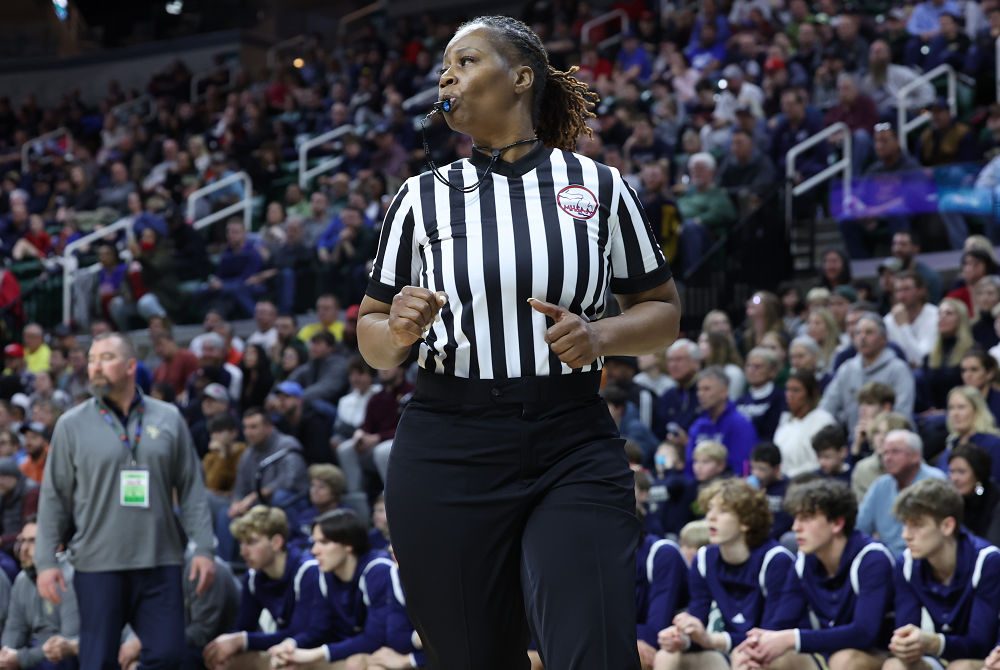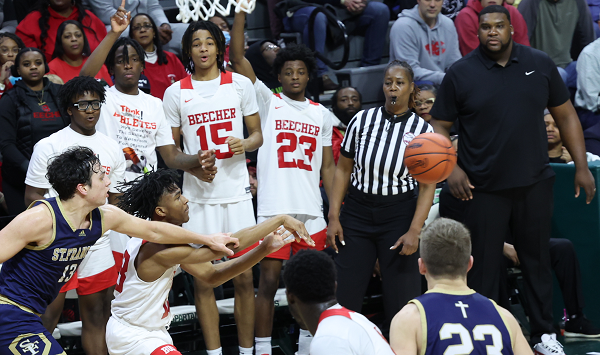
60 Years Later, Chassell Streak Stands
March 22, 2016
Sixty years ago, something happened in Michigan high school boys basketball that hadn’t happened before and hasn’t happened since – three Upper Peninsula teams won titles. Stephenson beat Detroit St. Andrew, 73-71 in overtime when “Marvelous” Mel Peterson made the first basket of sudden death; Crystal Falls (before it was called Forest Park) beat Berrien Springs, 71-69, in Class C; and Chassell won the first of three straight Class D titles, beating Portland St. Patrick, 71-68, by rallying from a 15-point deficit with less than four minutes to play.
The win was part of Chassell’s state record 65-game winning streak, which still stands. Below is an excerpt of a piece on the Chassell streak written before the teams were honored as part of the “Legends of the Games” program at the 1998 Boys Basketball Finals.
The old adage in sports states that records are made to be broken. The longer, however, the record stands, the more legendary the accomplishment becomes.
Chassell's wins were the centerpiece of Upper Peninsula success in the MHSAA Boys Basketball Tournament during the first 11 years after the format unified the two peninsulas. From 1932 to 1947, separate finals were conducted in both peninsulas. Between 1948 and 1958, Upper Peninsula schools won three Class B crowns (there were no Class A schools in the U.P. at the time), two Class C titles, and seven Class D championships – over one-third of the available first-place finishes.
Wrote the Marquette Mining Journal in 1956, the year that Stephenson in Class B, Crystal Falls in Class C and Chassell in Class D all won MHSAA titles, "All of these is a startling figure since in the period the U.P. has only 42 (schools) -- one eighth of all the lower class quarterfinalists.
"Under the law of averages, the U.P. should come up with one state champ every three years."
It looked at first that the law of averages would catch up with Chassell. After starting the 1955-56 season with 11 straight wins, the Panthers lost a close January game at Trout Creek, and then won their way downstate into the finals against Portland St. Patrick. In that final game, St. Patrick held a 15-point lead at 68-53 with less than four minutes to play.
Coach Ed Helakoski, the architect of the Chassell winning streak, called time out and told his team to apply full court pressure, a rarity at the high school level at that time.
Playing without standouts Terry Pokela and Tom Peters, who had fouled out, Chassell scored the final 18 points of the contest, the biggest game-ending rally in Finals history, and won the first crown, 71-68. Sophomore guard Don Mattson scored the winning points with only seconds to play, finished the game with a finals record 25 points, and the Panthers finished the season 25-1 with 14 consecutive victories.
During the 25-0 run to the crown in 1956-57, the only close games were regular-season wins against National Mine (71-66), L'Anse (64-63), Doelle (73-69), and a 58-50 decision over Stevensville in the championship game at Jenison Fieldhouse. Of the other 21 games, none were closer than 13 points, and the average margin of victory was 27 points.
The winning streak stood at 39 entering the 1957-58 season, and the 10-year state record of 59 consecutive victories by Mass from 1947-49 was within reach. However, Mattson was the only returning starter from the back-to-back championship teams, and perhaps Helakoski's greatest coaching job lay ahead to replace four starters in a school which had just over 30 boys enrolled in grades 9-12.
Doelle, which had given the Panthers one of its closest games the season before, was leading, 62-60, in an early-season contest. As time ran out, Bob Belhummer of Chassell was fouled at midcourt and sent to the free throw line with a one-and-one opportunity. Belhummer sank both shots to force the only overtime game of the streak, a 72-66 victory.
The new state record of 60 consecutive victories came in a 45-43 decision over Marenisco in the MHSAA District championship game. A trip over the newly-constructed Mackinaw Bridge came two weeks later and the Panthers became the first school to bring an MHSAA trophy across the structure when the 65th victory was recorded, a 66-61 decision over Owosso St. Paul. Mattson tallied 27 points in the finale to set another championship game record.
In the 40 years since Chassell's incredible feat, only twice has the winning streak been threatened. Flint Northwestern racked up 60 victories between January of 1984 and February of 1986; and Saginaw Buena Vista had a streak reach 55 games between December of 1991 and December of 1993.
In many communities, success streaks come and go, but a constant ideal of school sports then and today was captured by John Pyykkonen, a guard and forward on the 1956 and 1957 teams who summarized the events: "I remember the friendly competition amongst the members of the team and how well we worked together and how our parents, fans and the community were behind us 100 percent of the way. One of the greatest highlights in a young man's life and will never be forgotten."
Records were made to be broken. But legends, especially Legends of the Games like Chassell, endure the test of time.
GLORY DAYS ... Remembering The Streak
John Pyykkonen - 1956-57 Guard-Forward: "One thing I remember clearly, besides the games, is walking into Jenison Fieldhouse and being totally awestruck by the raised floor and the huge (in my eyes) guides who showed us around the building. I recall the game in 1956 when we were so far behind in points and we were able to overcome the point deficit by a full court press. The huge crowd gathered there were all cheering for the small-town team."
Robert Belhumer - 1956-1957-1958 Guard: "We had a great camaraderie among the members of our team. Also Chassell is a small town in the Upper Peninsula and the fans were there rooting for us during our seasonal games and were there for us at the championship games in Lansing."
Donald Jaakkola - 1956 Guard (On the championship game): "We ran out onto the court to a crowd of 12,000 people, most of whom were cheering for Portland St. Patrick. Needless to say, we felt a bit in awe as we came from Chassell, a small town in the Upper Peninsula.
"We were down 15 points with four minutes to go and two of our tallest players had fouled out earlier. Coach Ed Helakoski called a timeout and the basketball gods were with us. We threw a full court press defense and scored 18 points while holding St. Patrick scoreless. It gave us a screaming 71 to 68 victory. The crowd of 12,000 was now cheering for us."
Mike Wisti - 1956 Guard (On Coach Ed Helakoski): “I am quite sure there are many who will remember Ed Helakoski as a good coach. I'm sure he was a good coach; he had a knack for demanding discipline and teamwork, while not stifling the creativity of his players. However, I believe he should also be remembered as a great classroom teacher. He taught Government one year and Sociology the next and was the best classroom teacher that I had in high school. His ability to make Government interesting and explain how everything was designed to work is probably one of the biggest reasons for my lifelong interest in government and politics."
Kenneth Tormala - 1956-1957-1958 Forward: "The first year we surprised a lot of teams and people by winning the state championship. The second year we were picked to win when the year started and it would have been a real disappointment not to have done so. The third year was a real challenge since we lost so many players, but we had the backbone of the team, Don Mattson, who was an all-stater. This team was the most closely knit of all. We had a lot of very close games and had to dig down to everything we had learned to win many of them. A very satisfying year and we kept the winning streak going, to the surprise of many, including the previous teams.
"These memories will be fondly remembered until we die. Thank you to the late Mr. Helakoski."
James Komula, 1958 Guard (On what stands out from that season): "Being from a small town and playing in small gyms, the spaciousness and large crowd in Jenison Fieldhouse proved very exciting. Also, the reception and festivities upon our triumphant return to Chassell will forever be a highlight of personal memories. People were waiting in their vehicles nearly 30 miles from town to accompany our motorcade home.
"Although I didn't give it much thought, the experience and influence of playing on that team would set the direction for my career. Upon graduation from Michigan Tech, I was given an interim position to teach and coach at L'Anse High School. In 1966, I was assistant coach when L'Anse won the Class C state championship. After that I moved to Livonia, where in later years I was head coach at Bentley High School. Although I never intended, my high school basketball did influence my career to work with youngsters, and help them share in the rewards of the commitment and lifelong learning of athletics."
Terry Pokela, 1956-1957 Center: "We truly had a team. Coach Helakoski did not allow us to think of individual statistics or anything like that. He constantly emphasized the team concept. It certainly paid off.
"Also, we were one of the first teams to fast break after every missed shot by opponents. Our three-lane break broke many team's backs, as they couldn't keep up with us. Coach Helakoski emphasized rebounding position to enable the fast break to get started. We could also shoot field goals from any part of the court. Don Mattson would have scored 40 points a game if the three-point field goal would have been in effect."

Little Provides Major Stride as 1st Woman to Officiate Boys Hoops Final since 1995
By
Keith Dunlap
Special for MHSAA.com
April 13, 2023
Delonda Little was already a trailblazer to many before this year’s MHSAA Boys Basketball Finals.
 But what happened last month at Breslin Center made her even more of one on a statewide level.
But what happened last month at Breslin Center made her even more of one on a statewide level.
A referee and assigner for 20 years in the Detroit area, Little is a female boys and girls basketball official who mentors both male and female referees – no matter the gender or level, as she officiates high school and college games.
Officials often go to Little for guidance, direction and assignments, which has made her respected for years throughout Metro Detroit in the prep basketball community. Then, her status as a trailblazer grew even more.
Little was assigned as an official for the Division 3 Boys Basketball Final between Flint Beecher and Traverse City St. Francis, and she became the first female referee to officiate an MHSAA Boys Basketball Final since Traverse City’s Barb Beckett 1995.
“It was a very good feeling to know I was the one selected,” said Little, who officiated the Final with Matt Olson and Zach Porritt.
In fact, while attending a Semifinal game the Friday before the Final, Little received a phone call from an area code she didn’t recognize.
She answered, and it was Beckett.
“At first I didn’t know the name,” Little said. “I said, ‘No, I don’t know you, but that’s fine.’”
Beckett then explained she was the first female referee to be assigned a Boys Basketball Final, and just wanted to offer support to Little.
At that point, Little became excited and thankful she answered the call.
“It was very nice to hear from her because she wanted to reach out and if not pass the torch, to congratulate me,” Little said.
Little, 51, said she found out she was going to be refereeing the Division 3 boys championship game just before the start of the postseason when she received an email from the MHSAA.
“I’m looking at the email and I’m like, boys?” Little said. “I was shocked.”
But she was shocked in a good way, and obviously excited for the honor.
 Little didn’t find out until a couple of days before the St. Francis/Beecher contest that she would be officiating that specific championship game, but the Monday of boys championship week was when she really started to receive congratulations from friends and colleagues.
Little didn’t find out until a couple of days before the St. Francis/Beecher contest that she would be officiating that specific championship game, but the Monday of boys championship week was when she really started to receive congratulations from friends and colleagues.
That’s when an article came out in the Detroit News detailing her selection, which led to countless calls, texts and congratulatory messages on social media.
“I couldn’t even (keep up with the comments),” she said. “That’s how overwhelming the actual tags were. It came from all across the state with officials, men and women, because I do women’s college (games). Some of the college ladies were reaching out. I was getting all the hoopla before the game.”
Little said she normally doesn’t get nervous for games, but not having some nerves became a bit harder once so many people knew of her achievement.
However, she settled into a normal routine quickly once the game started.
“I wanted to get it done, get it over with and do well,” she said.
Little did do well, which is no surprise to everyone who knew her before she officiated on the boys championship stage.
It was just another feather in the cap for Little, who in 2016 became the first woman to officiate a boys Detroit Public School League championship game.
“Delonda is one of the top officials in the Detroit area, and our staff doesn’t look at Delonda as a female working a boys game – we see one of the top officials in Detroit working a basketball game,” MHSAA Executive Director Mark Uyl said. “There are females officiating in the NBA and female officials in the NCAA Men’s Basketball Tournament. The aspect that made Delonda’s selection for this MHSAA championship game nearly unique will soon be the norm at all levels of athletics.”
Little graduated from Detroit Osborn in 1989 and starred on the basketball court at Wayne State, earning induction into WSU’s Athletic Hall of Fame in 2005.
Her day job is as an officer for the Michigan Department of Corrections, but her passion is officiating. She’s been an MHSAA-registered official for basketball for two decades and also was registered for volleyball for four years. This past fall she registered for football for the first time.
“I get something from it because it keeps me in shape, I love the people I work with and I like the kids,” Little said. “You are always teaching, and I like training the newer officials. I just enjoy it. I don’t know what I’d be doing if I wasn’t refereeing.”
Going forward, Little hopes her championship game assignment will now be an inspiration for other female referees.
“There aren’t very many women who would like to work boys basketball or feel comfortable,” Little said. “If that’s something they desire, I’m hoping more women are selected to work the games if they feel comfortable.”
 Keith Dunlap has served in Detroit-area sports media for more than two decades, including as a sportswriter at the Oakland Press from 2001-16 primarily covering high school sports but also college and professional teams. His bylines also have appeared in USA Today, the Washington Post, the Detroit Free Press, the Houston Chronicle and the Boston Globe. He served as the administrator for the Oakland Activities Association’s website from 2017-2020. Contact him at [email protected] with story ideas for Oakland, Macomb and Wayne counties
Keith Dunlap has served in Detroit-area sports media for more than two decades, including as a sportswriter at the Oakland Press from 2001-16 primarily covering high school sports but also college and professional teams. His bylines also have appeared in USA Today, the Washington Post, the Detroit Free Press, the Houston Chronicle and the Boston Globe. He served as the administrator for the Oakland Activities Association’s website from 2017-2020. Contact him at [email protected] with story ideas for Oakland, Macomb and Wayne counties
PHOTOS (Top) Delonda Little takes her position on the court during the Division 3 Boys Basketball Final on March 25 at Breslin Center. (Middle) Little monitors the action between Flint Beecher and Traverse City St. Francis.

